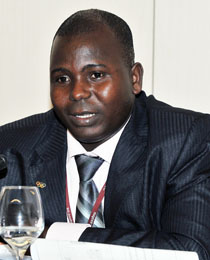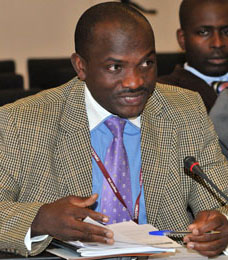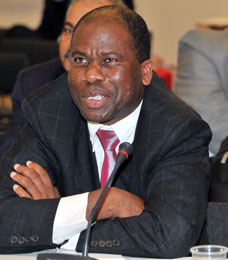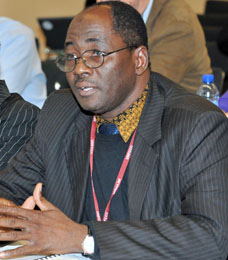|
|
 |
 |
 |
 |
 |
Enter your e-mail address
to get free e-mail reports |
|
|
|
|
 |
 |
 |
 |
 |
 |
 |
 |
Daily Reports
IISD Reporting Services (IISD RS) has produced daily reports of selected side events of this meeting. To download our reports please click below on the PDF icons that are next to the dates of your interest. |
|
 |
 |
 |
 |
|
 ENB on the Side - A Special Report on Selected Side Events at the Barcelona Climate Change Talks 2009 ENB on the Side - A Special Report on Selected Side Events at the Barcelona Climate Change Talks 2009
2-6 November 2009 | Barcelona, Spain
Events convened on Tuesday, 3 November 2009 |
 |
 |
 |
 |
This event brought together senior members of the IPCC to discuss the key outputs of the Fourth Assessment Report (AR4), the Fifth Assessment Report (AR5) process and new scientific advances that will be addressed in AR5.
Renate Christ, IPCC Secretary, reported on the 31st session of the IPCC, which took place in Bali, Indonesia, from 26-29 October 2009. She noted a focus on the chapter outlines for AR5, which have more in-depth assessment of various topics, including regional issues, aerosols, sea-level rise, human security, finance and investment.
Rajendra Pachauri, IPCC Chair, highlighted the important role of science as the basis for decision-making on climate change. He emphasized that addressing climate change is also an ethical imperative and that parties need to seal the deal and not “steal the deal” in Copenhagen. He urged a focus on responsibilities to the world as a whole rather than personal and myopic self-interest.
Thomas Stocker, Co-Chair of Working Group I, said AR4 demonstrates that warming is unequivocal and is very likely due to increased greenhouse gas concentrations. He explained that new studies to be assessed in the AR5 show that current greenhouse gas concentrations are 29% higher than any time in the last 800,000 years, that there is widespread and rapid thinning of the Greenland and Antarctic ice sheets, that sea level rise is consistent with earlier projections, and that increased concentrations of carbon dioxide in the oceans are causing acidification. In terms of new projections, he noted new information on the long-term commitment and irreversibility of carbon dioxide perturbation, widespread increases of health-related heat conditions, and the potential for rapid climate impacts when stopping geo-engineering.
Jean-Pascal van Ypersele, IPCC Vice-Chair, noted key examples from Working Group II of current impacts, including glacial retreat in the Himalayas and Andes threatening water supplies for large populations. He stressed that adaptation is critical to addressing unavoidable impacts and that the costs and limitations of adaptation make mitigation important. He also said that risks once considered severe at a 2°C increase are now considered severe at an 1.5°C increase above pre-industrial levels, based on the AR4.
Participants also discussed the projected costs of adaptation, the health impacts of climate change, and geo-engineering. |
|
 |
 |
 |
 |
|
 |
 |
 |
 |
The event focused on key issues relevant to post-2012 financial flows for mitigation and adaptation, including securing the necessary financing, experiences and lessons of managing funds, and matching support with enhanced mitigation and adaptation plans.
Jan Corfee-Morlot, OECD, discussed overall financial architecture and the role of measurement, reporting and verification (MRV) for evaluating the effectiveness of financial support. She focused on how to use limited public and international flows to leverage private flows, build capacity, and improve effectiveness through support of MRV systems in recipient countries.
Rémy Paris, OECD, outlined the Development Assistance Committee’s oversight of development finance to support climate change action. He noted that coordination and monitoring are essential for oversight of mitigation and adaptation programmes.
Jane Ellis, OECD, described matching support with actions, as well as the role of registries in recording actions and identifying further funding needs. She highlighted screening, prioritizing and information feedback as essential steps in matching funds with programmes.
Discussants, including Leif Ervik, Norway, and Kaveh Zahedi, UNEP, spoke about financial flows and programmes in mitigation and adaptation efforts. They identified challenges in terms of negotiating finance in the post-2012 agreement, applying MRV in evaluating funding, and ensuring that recipients are ready to implement programmes for which they are given funding. |
|
 |
 |
 |
 |
 |
 |
 |
 |
This event examined the status of NAPA implementation and other elements of the Least Developed Countries (LDCs) work programme. The event involved participants from the LDC Group, the LDC Expert Group (LEG), and other relevant organizations.
Paul Desanker, UNFCCC Secretariat, noted considerable progress on NAPAs over the past year.
Fred Onduri Machulu, LEG Chair, said NAPA preparation had been a long process, but 43 NAPAs have now been submitted. He reported approval of 33 projects, primarily in Africa. He said agriculture and food security was a focus of many projects, with others focused on coastal systems, water resources, early warning systems and disaster management.
LEG members Ben Karmorh, Liberia, and Beth Lavender, Canada, outlined key products and outcomes relating to the LEG Work Programme for 2008-2010. Key products included additional material in English, French and Portuguese on the UNFCCC website, a technical paper and a “Step-By-Step Guide for Implementing NAPAs.” Work in 2010 will include four regional training workshops and a focus on implementation and lessons learned.
Bruno T. Sekoli, LDC Group Chair, urged funding support for NAPAs, noting that US$2 billion had been proposed as the amount needed for funding NAPA implementation. He supported the LEG continuing beyond 2010.
Delegates were also briefed on the first training workshop on NAPA implementation (Dar es Salaam, Tanzania, October 2009) and new NAPAs from Afghanistan and Togo. Several participants also highlighted the issue of co-financing.
|
|
 |
 |
 |
 |
|
|
|
 |
 |
 |
 |
 |
| Paul Tchinguilou (Togo), outlined his country’s sectoral and regional approach to its NAPA, noting that access to funds, procedural issues and lack of capacity were barriers to implementation. |
|
 |
 |
 |
 |
|
 |
 |
 |
 |
 |
 |
 |
 |
| Participants during the discussion. |
|
 |
 |
 |
 |
 |
 |
 |
 |
IISD and ICTSD presented insights and lessons on IPRs and investment, focusing on issues of direct relevance to the climate change negotiations.
Mark Halle, IISD, discussed fossil fuel subsidies, which he said distort markets and reduce funding for alternative energy. He suggested that subsidy reform could have a major impact on climate change, given that about one percent of global GDP goes towards such subsidies. He noted widespread subsidies for production in the North and consumption in the South amounting to US$500-750 billion. However, he highlighted obstacles to change, including strong domestic lobbies. He suggested the World Trade Organization and G-20 as possible fora for pursuing change.
Ahmed Abdel Latif, ICTSD, discussed technology transfer in terms of IPR issues such as ownership and licensing. He described research carried out in cooperation with UNEP and the European Patent Office for surveying licensing practices.
Dennis Tirpak, IISD, mapped out the financial architecture of investment after Copenhagen, involving an oversight committee and funding windows, for example for REDD. He said a global climate fund might need parallel national funds for mitigation, forestry, adaptation and capacity building.
Mahesh Sugathan, ICTSD, reviewed issues of energy efficiency and the use of technology transfer to bring about alternative energy development. He said such use would involve mapping technology and reviewing trade flows of technology.
Discussion centered on subsidies issues, IPR, technology transfer and energy equity as aspects of financing climate policies.
|
|
 |
 |
 |
 |
 |
 |
 |
 |
Experts from the Pew Center on Global Climate Change provided an update on US climate policy, regulatory actions and their vision of a successful outcome in Copenhagen.
Manik Roy, Pew Center on Global Climate Change, highlighted US domestic climate legislation. He identified key challenges, including lack of public recognition of the problem, partisan politics over the cap-and-trade proposal, the economic crisis, and a focus on health care, Afghanistan and Iraq. He predicted that a climate change bill could pass Congress by March 2010. He highlighted challenges facing the Senate, including achieving a super-majority to pass the legislation and the plethora of committees with jurisdiction over the issue.
Steve Seidel, Pew Center on Global Climate Change, reported that the Environmental Protection Agency has been taking steps to regulate greenhouses gases under the Clean Air Act. He identified some weaknesses of this approach, including the limited reductions achievable under the Act, lack of flexibility, the fact that it is not comprehensive, and the political risks associated with regulatory action.
Elliot Diringer, Pew Center on Global Climate Change, said that while a comprehensive, legally-binding agreement with verifiable commitments by all major economies is the ideal outcome in Copenhagen, the best probable outcome is a political agreement establishing a broad architecture. He said an agreement should have a long-term target of reducing emissions by 50% by 2050, mid-term targets or ranges, and a collective peaking year for developing countries. He emphasized MRV and facilitative compliance mechanisms.
Discussions revolved around potential outcomes in Copenhagen, balancing scientific and political imperatives and cap-and-trade versus carbon taxes. |
|
 |
 |
 |
 |
 |
 |
 |
 |
This event considered a study on tradable intensity standards for sector crediting and the links between domestic sectoral programmes and an international post-2012 climate change regime.
Ned Helme, Center for Clean Air Policy (CCAP), outlined CCAP’s work on options for developing countries to earn credits from nationally appropriate mitigation actions (NAMAs). He presented a paper on “A Tradable Intensity Standard for Sectoral Crediting,” which found that sectoral approaches are feasible for developing countries and can potentially deliver significant emissions reductions. He suggested that a tradable intensity standard could be used to implement a “no-lose” approach to sector crediting in developing countries. He added that intensity standards make more sense for developing countries than absolute targets.
William Whitesell, CCAP, noted that any international framework would have to be sufficiently flexible to accommodate the goals and interests of different developing countries. He suggested that sectoral trading or crediting could be viewed as an interim step towards cap-and-trade, and also outlined how a government-run approach to sectoral crediting could incentivize the private sector.
Andreas Löschel, Centre for European Economic Research, spoke about the trade impacts of a sectoral approach in the cement sector, using preliminary results from a quantitative analysis.
Kim Carnahan, International Emissions Trading Association, reviewed the CCAP paper. She suggested that the list of unresolved issues relating to sectoral crediting continues to increase, and said more work was needed to define what precisely is meant by “intensity” and what is included in a particular sector. She also urged flexibility on applying the most useful solutions to different scenarios, and highlighted challenges with setting baselines.
Participants raised a number of issues, including the details of how crediting would work, the role of governments, and concerns over baselines and compliance. |
|
 |
 |
 |
 |

 |
 |
 |
 |
UN Framework Convention on Climate Change (UNFCCC) resources
 Official website Official website
 Daily programme Daily programme
 Side Events & Exhibits Side Events & Exhibits
 AWG-KP documents AWG-KP documents
 AWG-LCA documents AWG-LCA documents
 UNFCCC News UNFCCC News
UN resources
 Gateway to the UN System’s Work on Climate Change Gateway to the UN System’s Work on Climate Change
 Informal Thematic Debate of the UN General Assembly on Climate Change as a Global Challenge Informal Thematic Debate of the UN General Assembly on Climate Change as a Global Challenge
IISD RS resources
 IISD RS coverage of the Bangkok Climate Change Talks - 2009, 28 September - 9 October 2009, UN Conference Centre (UNCC), Bangkok, Thailand IISD RS coverage of the Bangkok Climate Change Talks - 2009, 28 September - 9 October 2009, UN Conference Centre (UNCC), Bangkok, Thailand
 IISD RS coverage of the Bonn Climate Change Talks - August 2009, 10-14 August 2009, Bonn, Germany IISD RS coverage of the Bonn Climate Change Talks - August 2009, 10-14 August 2009, Bonn, Germany
 IISD RS coverage of the Bonn Climate Change Talks - June 2009, 1-12 June 2009, Bonn, Germany IISD RS coverage of the Bonn Climate Change Talks - June 2009, 1-12 June 2009, Bonn, Germany
 IISD RS coverage of the UNFCCC Technical Workshop on Increasing Economic Resilience to Climate Change and Reducing Reliance on Vulnerable Economic Sectors through Economic Diversification, 28-30 April 2009, Cairo, Egypt IISD RS coverage of the UNFCCC Technical Workshop on Increasing Economic Resilience to Climate Change and Reducing Reliance on Vulnerable Economic Sectors through Economic Diversification, 28-30 April 2009, Cairo, Egypt
 IISD RS summary report of the Thirtieth Session of the Intergovernmental Panel
on Climate Change (IPCC), 21-23 April 2009, Antalya, Turkey (English: HTML - PDF) (Spanish: HTML - PDF) (Japanese: PDF) IISD RS summary report of the Thirtieth Session of the Intergovernmental Panel
on Climate Change (IPCC), 21-23 April 2009, Antalya, Turkey (English: HTML - PDF) (Spanish: HTML - PDF) (Japanese: PDF)
 IISD RS coverage of the Bonn Climate Change Talks - March/April 2009, 29 March - 8 April 2009, Bonn, Germany IISD RS coverage of the Bonn Climate Change Talks - March/April 2009, 29 March - 8 April 2009, Bonn, Germany
 IISD RS summary report of the UNFCCC Workshop on Integrating Practices, Tools and Systems for Climate Risk Assessment and Management and Disaster Risk Reduction Strategies into National Policies and Programmes, 10-12 March 2009, Havana, Cuba (HTML - PDF) IISD RS summary report of the UNFCCC Workshop on Integrating Practices, Tools and Systems for Climate Risk Assessment and Management and Disaster Risk Reduction Strategies into National Policies and Programmes, 10-12 March 2009, Havana, Cuba (HTML - PDF)
 IISD RS coverage of the UN Climate Change Conference - Poznań, 1-12 December 2008, Poznań, Poland IISD RS coverage of the UN Climate Change Conference - Poznań, 1-12 December 2008, Poznań, Poland
 IISD RS coverage of AWG-LCA 2, second part of the AWG-KP 5, and twenty-eighth sessions of the SBSTA and the SBI of the UNFCCC, 2-13 June 2008, Bonn, Germany IISD RS coverage of AWG-LCA 2, second part of the AWG-KP 5, and twenty-eighth sessions of the SBSTA and the SBI of the UNFCCC, 2-13 June 2008, Bonn, Germany
 IISD RS climate and atmosphere page IISD RS climate and atmosphere page
 Climate-L - A mailing list for news on climate change policy Climate-L - A mailing list for news on climate change policy
 Linkages Update - Bi-weekly international environment and sustainable development news Linkages Update - Bi-weekly international environment and sustainable development news
 MEA Bulletin - Newsletter on key MEAs and their secretariats MEA Bulletin - Newsletter on key MEAs and their secretariats
 Climate Change Policy & Practice - News and information on the actions of international organizations in responding to the problem of global climate change Climate Change Policy & Practice - News and information on the actions of international organizations in responding to the problem of global climate change
 African Regional Coverage African Regional Coverage |
|
 |
 |
 |
 |
|
|
 |
 |
 |
 |
 Please e-mail the Digital Editor should you have any questions regarding the content of this page Please e-mail the Digital Editor should you have any questions regarding the content of this page |
 |
 |
 |
 |
|
|
|